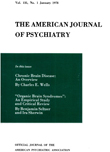The psychological effects of isolation in protected environments
Abstract
The authors questioned the directors of 13 protected-environment installations on the psychological effects of protected environment treatment. Psychological problems reported included anxiety, depression, sleep disturbance, withdrawal, regression, and hallucinations. Children seemed to adapt better than adults to protected environments. Respondents recommended the use of preentry orientation, structured recreation programs, steps to prevent time disorientation, and psychological support for both patients and staff to minimize the psychological effects of treatment in protected environments.
Access content
To read the fulltext, please use one of the options below to sign in or purchase access.- Personal login
- Institutional Login
- Sign in via OpenAthens
- Register for access
-
Please login/register if you wish to pair your device and check access availability.
Not a subscriber?
PsychiatryOnline subscription options offer access to the DSM-5 library, books, journals, CME, and patient resources. This all-in-one virtual library provides psychiatrists and mental health professionals with key resources for diagnosis, treatment, research, and professional development.
Need more help? PsychiatryOnline Customer Service may be reached by emailing [email protected] or by calling 800-368-5777 (in the U.S.) or 703-907-7322 (outside the U.S.).



